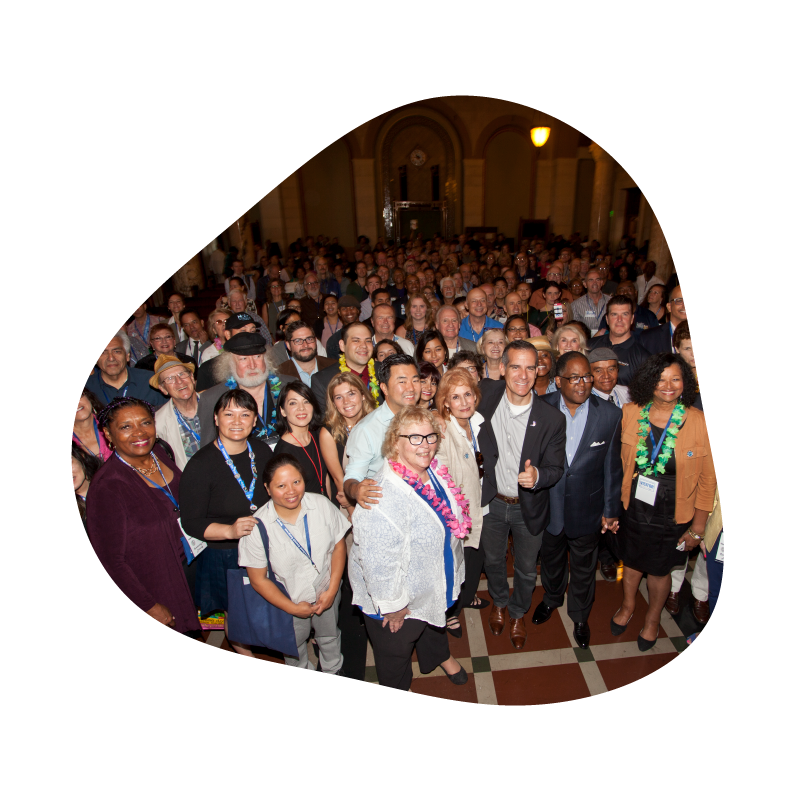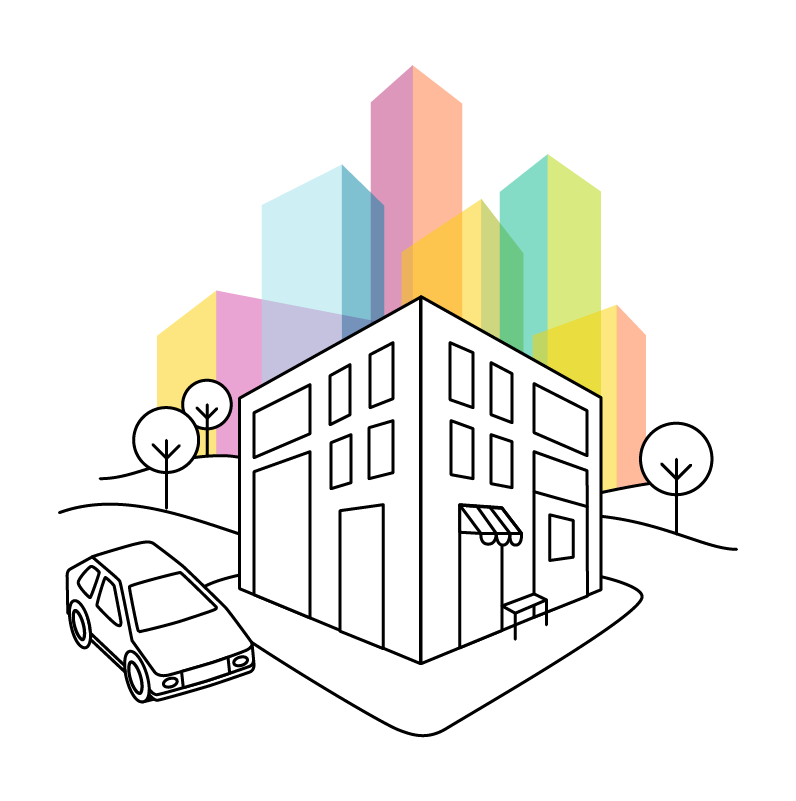
WHAT ARE
NEIGHBORHOOD
COUNCILS ?
Neighborhood Councils are the closest form of government to the people. They give their communities a voice at City Hall on important issues like development, homelessness, and public safety. The Neighborhood Council system was established in 1999 as a way of ensuring that the City government remains responsive to the different needs and lifestyles of Los Angeles’ rich variety of communities.

WHO SERVES ON A
NEIGHBORHOOD COUNCIL?
There are currently 99 Neighborhood Councils in Los Angeles, each serving an average of 40,000 people. Neighborhood Councils are comprised of city-certified board members elected by those who live, work, own property or a business, or have some other substantial and ongoing involvement in the community that a Council represents. These board members donate their time and services as volunteers. Most board members serve two-year terms; a few Neighborhood Councils have four-year terms. Unlike other municipal, state, or federal elections, Neighborhood Councils are open to anyone who is part of the fabric of daily life in a community.
[Click here] to find out which Neighborhood Council you belong toHOW DO
NEIGHBORHOOD
COUNCILS SERVE
THE COMMUNITY?
With a yearly public fund to support their activities, Neighborhood Councils create events and programs that respond to the unique needs of their community. Neighborhood Councils advocate on behalf of issues people care about, like homelessness, housing, public safety, parks, and sustainability. Neighborhood Councils also receive advance notice of issues and projects that are important to their neighborhoods so they can understand, discuss, and voice their opinions to the City before final decisions are made. They also work with the Mayor and every City Department to identify and present an annual list of priorities for the City budget.


GET INVOLVED!
There are many ways you can get involved in a Neighborhood Council and advocate for your community. The simplest way is by getting on your Neighborhood Council’s email list or by attending a meeting. Typically, most Neighborhood Councils will have at least one board meeting a month, where they discuss issues, concerns, and motions affecting the neighborhood. In addition to staying informed, you can also join a committee (for a specific issue or an ad-hoc) or be a part of a regional alliance.
You can also run for office on your local Neighborhood Council. Elections happen every two years; or in between election years, there are often opportunities to fill vacancies on your board. If you’re interested in joining your Neighborhood Council, find out more by filling out this form [LINK].
Being a part of the 4 million people that make up Los Angeles means being a part of a large and diverse civic community. When you advocate for issues that affect your personal life, you are also advocating for your neighbors. So be the city official next door and join a Neighborhood Council today! Be the voice and the change for your community, one neighbor – and one neighborhood – at a time.
WHAT ARE
NEIGHBORHOOD
COUNCILS ?
Neighborhood Councils are the closest form of government to the people. They give their communities a voice at City Hall on important issues like development, homelessness, and public safety. The Neighborhood Council system was established in 1999 as a way of ensuring that the City government remains responsive to the different needs and lifestyles of Los Angeles’ rich variety of communities.

WHO SERVES ON A
NEIGHBORHOOD
COUNCIL?
There are currently 99 Neighborhood Councils in Los Angeles, each serving an average of 40,000 people. Neighborhood Councils are comprised of city-certified board members elected by those who live, work, own property or a business, or have some other substantial and ongoing involvement in the community that a Council represents. These board members donate their time and services as volunteers. Most board members serve two-year terms; a few Neighborhood Councils have four-year terms. Unlike other municipal, state, or federal elections, Neighborhood Councils are open to anyone who is part of the fabric of daily life in a community.
[Click here] to find out which Neighborhood Council you belong to
HOW DO
NEIGHBORHOOD
COUNCILS SERVE
THE COMMUNITY?
With a yearly public fund to support their activities, Neighborhood Councils create events and programs that respond to the unique needs of their community. Neighborhood Councils advocate on behalf of issues people care about, like homelessness, housing, public safety, parks, and sustainability. Neighborhood Councils also receive advance notice of issues and projects that are important to their neighborhoods so they can understand, discuss, and voice their opinions to the City before final decisions are made. They also work with the Mayor and every City Department to identify and present an annual list of priorities for the City budget.

GET INVOLVED!
There are many ways you can get involved in a Neighborhood Council and advocate for your community. The simplest way is by getting on your Neighborhood Council’s email list or by attending a meeting. Typically, most Neighborhood Councils will have at least one board meeting a month, where they discuss issues, concerns, and motions affecting the neighborhood. In addition to staying informed, you can also join a committee (for a specific issue or an ad-hoc) or be a part of a regional alliance.
You can also run for office on your local Neighborhood Council. Elections happen every two years; or in between election years, there are often opportunities to fill vacancies on your board. If you’re interested in joining your Neighborhood Council, find out more by filling out this form [LINK].


